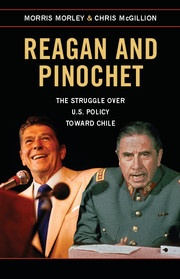3 - Dead Ends in Chile Policy
Published online by Cambridge University Press: 05 February 2015
Summary
By the beginning of Ronald Reagan’s second term, a number of factors were conspiring to make a gradual change in U.S. policy toward Chile inevitable. Prominent among these, in the most general sense, had been Reagan’s speech to the British Parliament in June 1982, in which he committed the United States to promoting “freedom and democracy” as a matter of principle throughout the world. The context for, and background to, this speech was the American President’s deeply held belief that the Soviet Union was an “evil empire,” utterly untrustworthy, and should eventually be consigned to history unless it was willing to fundamentally transform its society, politically and economically. The more immediate trigger was Reagan’s support for the Solidarity movement in Poland, which was posing a major challenge to the Soviet-backed government of General Wojciech Jaruzelski.
That speech had important repercussions. First, Reagan’s commitment did not sit well with the wholehearted support of a military strongman such as General Augusto Pinochet and left the White House open to the charge of double standards – supporting democracy where it served U.S. interests in the struggle against leftist movements and regimes, especially in Central America, but exempting dictatorships perceived as valued allies for strategic, political, or economic reasons. Indeed, in the closing months of 1984, pressure was again building inside Congress to apply tougher measures against Chile in response to the concern of some legislators that the administration, despite its lofty rhetoric, was simply choosing to ignore Pinochet’s continued repression. Second, the London speech gave some latitude to those State Department officials eager to pursue policy approaches beyond the strictures of the Kirkpatrick Doctrine and what it implied for Washington’s relations with anticommunist Third World autocrats. Jeane Kirkpatrick’s departure in early 1985 provided an opportunity to contest her interpretation and influence, especially in the White House. “[W]e started taking a different approach to Chile,” recalled a senior U.S. official, and simultaneously “started to draw new lessons from the fall of the Shah in Iran and of Somoza in Nicaragua.”
- Type
- Chapter
- Information
- Reagan and PinochetThe Struggle over US Policy toward Chile, pp. 105 - 146Publisher: Cambridge University PressPrint publication year: 2015

